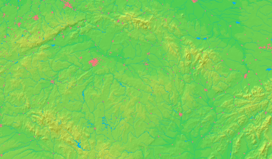Boží Dar
| Boží Dar | ||
| Town | ||
 | ||
|
||
| Country | Czech Republic | |
|---|---|---|
| Region | Karlovy Vary | |
| District | Karlovy Vary | |
| Commune | Ostrov | |
| Elevation | 1,020 m (3,346 ft) | |
| Coordinates | CZ 50°24′35.05″N 12°55′28.03″E / 50.4097361°N 12.9244528°ECoordinates: CZ 50°24′35.05″N 12°55′28.03″E / 50.4097361°N 12.9244528°E | |
| Area | 37.97 km2 (14.66 sq mi) | |
| Population | 185 (2005) | |
| Density | 5/km2 (13/sq mi) | |
| Mayor | Jan Horník | |
| Timezone | CET (UTC+1) | |
| - summer (DST) | CEST (UTC+2) | |
| Postal code | 362 62 | |
  Location in the Czech Republic
| ||
 Location in Karlovy Vary District
| ||
| Wikimedia Commons: Boží Dar | ||
| Statistics: statnisprava.cz | ||
| Website: www | ||
Boží Dar (German: Gottesgab) is a town in Karlovy Vary District, part of Karlovy Vary Region in the Czech Republic. Situated in the Ore Mountains at 1,028 m (3,373 ft) above sea level, it is considered the highest town in the Czech Republic.
Geography

The settlement is located in northwestern Bohemia on a plateau close to the crest of the Western Ore Mountains and the border with Germany. Boží Dar is the site of a road border crossing to Oberwiesenthal in Saxony, controls have been abolished since the Czech Republic joined the Schengen Area in 2007.
The area around Mt. Klínovec, the highest peak of the Ore Mountains, east of the town is one of the most important winter sport regions in the Czech Republic. The skiing area stretches across the German border on the Schwarzwasser (Černá) creek to Mt. Fichtelberg in the north. The landscape near the village of Myslivny in the southwest of Boží Dar comprises the Božídarský Špičák nature reserve.
The municipal area comprises the cadastral communities of Boží Dar and Ryžovna (Seifen).
History

The remote area in the Saxon Barony of Schwarzenberg was settled after silver and tin mining began about 1517. Gottesgab ("Gift of God") was founded as a mining town by decree of the Wettin elector John Frederick I of Saxony, who acquired the lordship in 1532. Together with neighbouring Horní Blatná (Platten), John Frederick had to cede the town to the Habsburg lands of the Bohemian Crown in 1547 after the Schmalkaldic War and his defeat in the Battle of Mühlberg.
After World War I, Boží Dar became part of the First Czechoslovak Republic. It was mainly settled by Sudeten Germans and was one of the municipalities in Sudetenland annexed during the German occupation of Czechoslovakia in 1938. After World War II the German population was expelled, with only 189 inhabitants remaining in 1947. The historic town privileges were lost in the 1950s, but restored in 2006.
Notable people
- Kaspar Eberhard (1523–1575), Lutheran theologian, local pastor in 1554
- Nikos Kazantzakis (1883–1957), Greek writer, spent several months in Myslivny between 1929 and 1932
- Lukáš Bauer (born 1977), cross country skier, lives in Boží Dar
External links
-
 Media related to Boží Dar at Wikimedia Commons
Media related to Boží Dar at Wikimedia Commons - Municipal website
